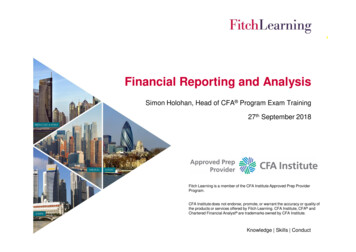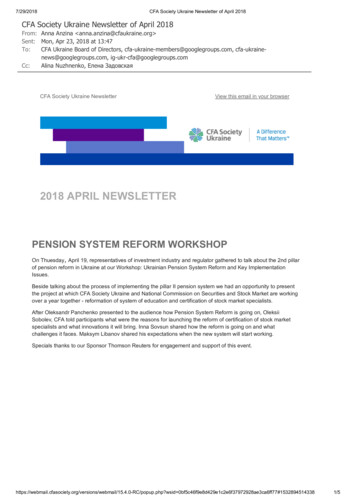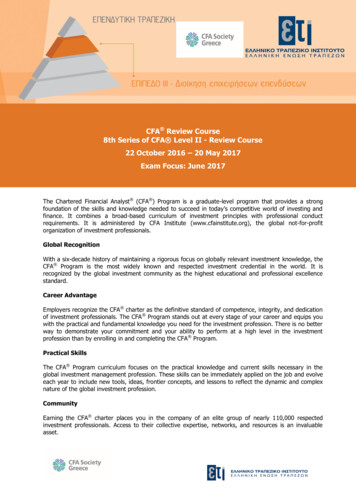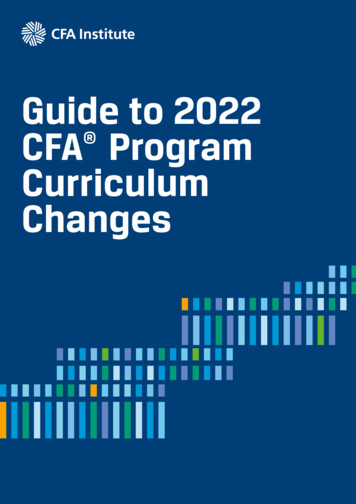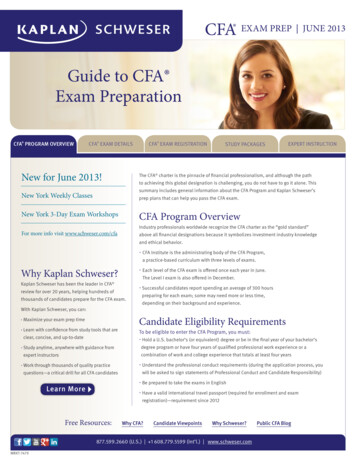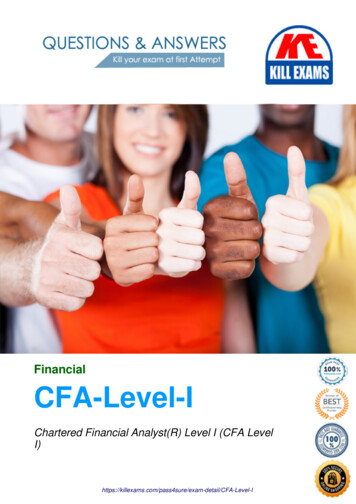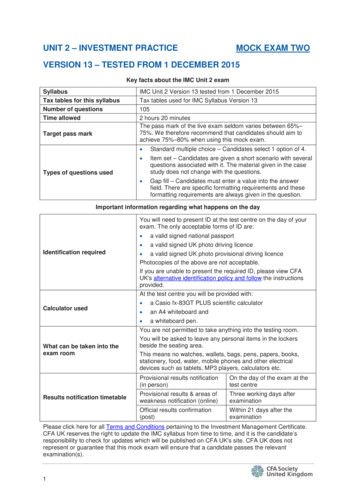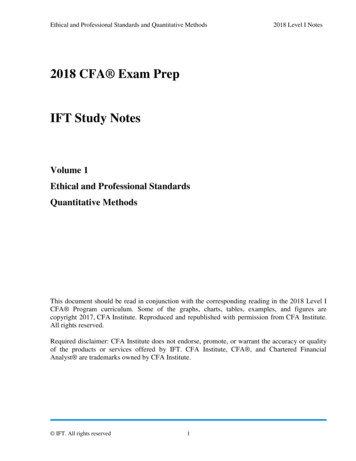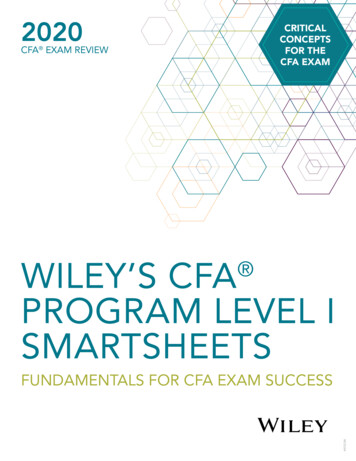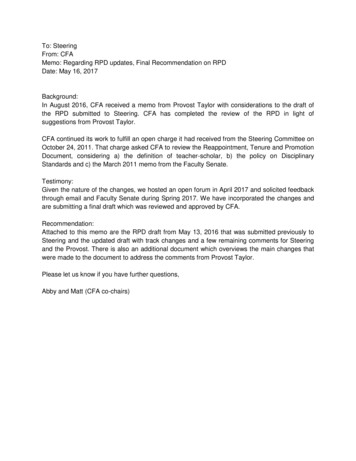
Transcription
To: SteeringFrom: CFAMemo: Regarding RPD updates, Final Recommendation on RPDDate: May 16, 2017Background:In August 2016, CFA received a memo from Provost Taylor with considerations to the draft ofthe RPD submitted to Steering. CFA has completed the review of the RPD in light ofsuggestions from Provost Taylor.CFA continued its work to fulfill an open charge it had received from the Steering Committee onOctober 24, 2011. That charge asked CFA to review the Reappointment, Tenure and PromotionDocument, considering a) the definition of teacher-scholar, b) the policy on DisciplinaryStandards and c) the March 2011 memo from the Faculty Senate.Testimony:Given the nature of the changes, we hosted an open forum in April 2017 and solicited feedbackthrough email and Faculty Senate during Spring 2017. We have incorporated the changes andare submitting a final draft which was reviewed and approved by CFA.Recommendation:Attached to this memo are the RPD draft from May 13, 2016 that was submitted previously toSteering and the updated draft with track changes and a few remaining comments for Steeringand the Provost. There is also an additional document which overviews the main changes thatwere made to the document to address the comments from Provost Taylor.Please let us know if you have further questions,Abby and Matt (CFA co-chairs)
TCNJ PROMOTION AND REAPPOINTMENT AND PROMOTION DOCUMENT2016Table of ContentsINTRODUCTION . 1PART ONE – BASES AND STANDARDS FOR EVALUATION . 2I. Faculty . 2II. Librarians. 65PART TWO – THE APPLICATION PROCESS FOR REAPPOINTMENT AND TENURE . 87I. OVERVIEW . 87II. ROLES AND RESPONSIBILITIES . 1210A.B.C.D.E.F.The Candidate. 1210The Department Promotion and Reappointment Committee (PRC) . 1210The Dean . 1412The College Promotions and Tenure Committee (CPTC) . 1412The Provost . 1513The President . 1614III. PROCEDURES AND TIMELINE FOR APPLYING FOR REAPPOINTMENT . 1614A. Ordinary timeline for reappointment . 17151. In the First Year: Formative review . 17152. In the Second Year: Summative review . 18163. In the Third Year: Summative review . 20174. In the Fourth Year: Formative review or Summative review . 20185. In the Fifth Year: Summative review for reappointment and tenure . 2018B. Modified Reappointment Process for applicants with a Qualifying Life Event . 2220PART THREE – THE APPLICATION PROCESS FOR PROMOTION . 2623I. OVERVIEW . 2623II. ELIGIBILITY FOR PROMOTION . 2623A. Minimum Eligibility – Faculty . 2623B. Minimum Eligibility – Librarians . 2724III. GENERAL BASES FOR PROMOTION. 2724Consistent accomplishment over time will be evaluated positively, while recognizing that a candidate'srelative contributions to the campus community in terms of teaching/librarianship,scholarly/creative/ professional activity, and service normally will vary over time. Therefore,periods of relatively less activity in one area should be complemented by greater activity in theothers, producing a consistently high level of accomplishment and balance overall. . 2825A. Bases for Promotion for Faculty . 28253. Service . 2926B. Bases for Promotion for Librarians . 31271. Librarianship . 3127i
Promotion to Librarian I requires continued achievement since attaining the rank of Librarian II,with evidence of previous and continuing scholarly/creative/professional endeavors. An externalreview may be requested by the applicant as one component of this evidence (see Part Five,Section VII). . 3227IV. ROLES AND RESPONSIBILITIES . 3329A.B.C.D.E.F.The Candidate . 3329The Department Promotion and Reappointment Committee (PRC) . 3430The Dean . 3531The College Promotions and Tenure Committee (CPTC) . 3631The Provost . 3732The President . 3733V. PROCEDURES FOR APPLYING FOR PROMOTION . 3733A. Timeline. 3733B. Withdrawing the Application . 4036C. Grievances . 4036VI. SUMMARY CHART OF RESPONSIBILITIES AND DEADLINES . 4137PART FOUR – COMMITTEE COMPOSITIONS AND REVIEW PROCESSSES. 4338I. DEPARTMENT PROMOTION AND REAPPOINTMENT COMMITTEE (PRC) . 4338A. Membership/Eligibility . 4338B. Selection of Committee Members . 4440II. COLLEGE PROMOTIONS AND TENURE COMMITTEE (CPTC) . 4440A.B.C.D.E.Membership/Eligibility . 4440Term of Service . 4541Nomination and Elections Procedures . 4641Operating Procedures . 4642Voting Procedures . 4742III. PEER REVIEW OF TEACHING . 4743A.B.C.D.Introduction . 4743Frequency of Peer Reviews . 4844Reviewer and Course Selection . 4844Process for the Peer Observation of Teaching . 4945IV. EXTERNAL REVIEW OF SCHOLARLY/CREATIVE/PROFESSIONAL ACTIVITY FORPROMOTION TO THE RANK OF PROFESSOR . 5248PART FIVE – FORMS . 5751I. STANDARD APPLICATION FOR PROMOTION AND REAPPOINTMENT . 5751II. STANDARDIZED CURRICULUM VITA . 6255III. INTENTION TO USE MULTIPLE DISCIPLINARY STANDARDS . 6961IV. DEPARTMENT/PROGRAM RECOMMENDATION FOR REAPPOINTMENT . 7062V. DEPARTMENT/PROGRAM RECOMMENDATION FOR REAPPOINTMENT TO SEVENTHYEAR WITH TENURE . 7163VI. DEPARTMENT/PROGRAM RECOMMENDATION FOR PROMOTION . 7264VII. LETTER TO EXTERNAL REVIEWER FOR PROMOTION TO RANK OF PROFESSORONLY . 7365ii
IntroductionINTRODUCTIONThe Promotion and Reappointment and Reappointment Document (RPD) contains standards andprocedures for promotion and reappointment for faculty and librarian candidates. This document replacesthe 2011 12/06/Promotion-Reappointment2011.doc ),the 2014 PRD f), and the 2015 PRD . This 2016 version of the PRDdocument includes anumber of changes relative to the October 2015 PRDversion. These changes were approved through thegovernance process and those relating to processes and timelines have been agreed to by the TCNJFT,Local 2364, AFT. The major changes are listed below:- Merging of Application for the Reappointment to Seventh Year with Tenure and thePromotion to Associate Professor/Librarian II ProcessesFull-time tenure-track Assistant Professors or Librarian III (Instructor in the Library) whocommenced their employment with The College of New Jersey on or after August 1, 2015,shall now be considered for promotion from Assistant Professor to Associate Professor orLibrarian III to Librarian II concurrently with their consideration for reappointment to aseventh year (with tenure). This process is now set forth in Part Two, The ApplicationProcess for Reappointment and Tenure.- Adjustment of Timeline for Applications for Reappointment and for Reappointment toSeventh Year with Tenure and PromotionThe timeline for applying for reappointment have been adjusted to allow for sufficient timefor consideration by the College Promotions and Tenure Committee (when necessary), aswell as to provide candidates adequate time to consider and respond to recommendationsmade by the Department Promotion and Reappointment Committee, the Dean, or theProvost.It should be noted, however, that the reappointment process and timeline could, depending on severalfactors set forth herein, remain unchanged from the Promotion and Reappointment 2011 document, forfaculty and librarians hired on or before July 15, 2014. For reference, the following table sets forth thespecific document and section that apply to faculty and librarians according to their date of hire, their rankat time of application, and desired reappointment or promotion action.HIREDATEPrior ANK(at time of application)REAPPOINTMENTONLYYears 1-3Reappointmentapplication: 2011 PRDYears 1-4Assistant Professor orReappointmentLibrarian IIIapplication: 2014 PRDYears 1-4Associate Professor,ReappointmentProfessor or Librarian IIapplication: 2014 PRDYears 1-4Assistant Professor orReappointmentLibrarian IIIapplication: 2016 RPRDYears 1-4Associate Professor,ReappointmentProfessor or Librarian IIapplication: 2016 RPRDAll Facultyand LibrariansDESIRED ACTIONREAPPOINTMENT REAPPOINTMENTPROMOTIONWITH TENUREWITH TENURE ANDONLYONLYPROMOTIONYear 4PromotionApplication to 6th year:Not availableApplication:2011 PRD2016 RPRDYear 5Year 5PromotionApplication to 7th year: OR Application to 7th Application:2014 PRDyear: 2015 PRD2016 RPRDYear 5PromotionApplication to 7th year:Not availableApplication:2014 PRD2016 RPRDYear 5PromotionNot availableApplication to 7th year: Application:2016 RPRD2016 RPRDYear 5PromotionApplication to 7th year:Not availableApplication:2016 RPRD2016 RPRDReappointment and Promotions Document – Draft, 5/13/20161
IntroductionPART ONE – BASES AND STANDARDS FOR EVALUATIONThe College of New Jersey affirms that a community of learners and scholars is built around highexpectations in which all members use and develop their talents to make the College a better place. TheCollege expects exemplary achievement, and it strives to hire teachers-scholars who will be successful in theinitial evaluation process and continued professional growth.All decisions regarding faculty and librarian evaluation and development are based on onal activity, and service, and f. Faculty are expected to demonstrateaccomplishments and meet the standards in all three categories. , and although all areas are important, thesethree broad areas do not count equally in the evaluation process. High quality teaching or librarianship is themost important of the required criteria for reappointment and promotion; scholarly/creative/professionalactivity is the second most important area; and the candidate's service record ranks third.I. Faculty1. TeachingAccording to the College’s Mission, “TCNJ’s exceptional students, teacher-scholars, staff, alumni, and boardmembers constitute a diverse community of learners, dedicated to free inquiry and open exchange, toexcellence in teaching, creativity, scholarship, and citizenship, and to the transformative power of educationin a highly competitive institution. The College prepares students to excel in their chosen fields and to create,preserve and transmit knowledge, arts, and wisdom.” Faculty should aspire to be teachers of the first order.A high caliber, effective teacher:1. Shows subject mastery, currency, and ongoing growth in one's discipline and/or across disciplines;2. Carefully prepares organized lessons and pedagogical materials designed to guide and enhancestudent learning;3. Demonstrates enthusiasm for the topics under study and models intellectual curiosity, and creates acaring learning environment, safe for students wishing to express contrary or unpopular views andrespectful of diverse perspectives;4. Ensures class meetings and other learning opportunities, including providing student feedback, areconducted in a timely and professional manner;5. Incorporates one's scholarship into teaching, when appropriate, including the effective supervision ofstudent research and the incorporation of students into one's scholarship, when appropriate;6. Extends teaching commitment to all levels of the curriculum, including First Seminars, liberallearning, introductory courses, graduate courses, and Signature Experiences where appropriate;7. Articulates and attends to student learning outcomes that help develop students as successful, ethical,and visionary leaders in a multicultural, highly technological, and increasingly global world;8. Conveys an intellectual and professional interest in individual student learning;9. Innovates and experiments with pedagogy in ways that foster engaging educational environmentsthat are characterized by academic freedom, creative expressions, critical thinking, intellectualinquiry, and community engagement;10. Creates and revises courses and curricula in ways that foster a vibrant, intellectual community builtaround a shared commitment to scholarly inquiry;11. Provides well-informed, thoughtful mentorship and advising appropriate to the students’ personaland professional development;12. Strives for respectful and fair treatment when interacting with individual students;Reappointment and Promotions Document – Draft, 5/13/20162
Part Two – Reappointment13. Capable of adjusting the educational experience in response to individual student needs;14. Demonstrates rigor, transparency, and consistency in evaluating student work; and15. Provides evidence of continued improvement and sustained high quality teaching in the form ofteaching materials, student evaluations, and peer feedback, resulting in growing a body of work thatsupports teaching excellence. (The occasional course might be evaluated at less than a high level,for example when a new course is being developed. This should be explained in the application.)The College is an exemplary comprehensive institution with the mission of offering a quality education tohigh achieving students in a residential setting where teaching is an essential priority. Faculty should aspireto be teachers of the first order. High caliber, effective teaching may be characterized by:1. Subject mastery, currency, and ongoing growth in one's discipline and/or across disciplines;2. The creation of caring and respectful learning environments in which the contributions of studentsand faculty are valued and recognized;3. Enthusiasm that arouses student interest, curiosity, and motivation;4. Rapport with students;5. Incorporation of one's scholarship into teaching, when appropriate, including the effectivesupervision of student research and the incorporation of students into one's scholarship, whenappropriate;6. Commitment to all levels of the curriculum, including First Seminars, liberal learning, introductorycourses, and graduate courses, where appropriate;7. Careful preparation and clear organization of lessons and pedagogical materials that enhance studentlearning;8. Attention to student learning outcomes that help develop students as successful, ethical, andvisionary leaders in a multicultural, highly technological, and increasingly global world;9. Purposeful experimentation with one's pedagogy in ways that foster engaging educationalenvironments that are characterized by academic freedom, creative expressions, critical thinking,intellectual inquiry, and community engagement;10. The creation and/or revision of courses and curricula in ways that foster a vibrant, intellectualcommunity that is built around a shared commitment to scholarly inquiry;11. Thoughtful mentorship and advising that contribute to students' cultural, social, and intellectuallives;12. Respect for and fair treatment of students as individuals;13. Pride in offering an individualized educational experience to every student;14. Timeliness and professionalism in meeting classes and evaluating student work; and15. Rigor and transparency in evaluating student work;16. Evidence of continued improvement or sustained excellence in teaching in response to feedbackfrom peers and students, and a growing record of teaching excellence. (The occasional course mightbe evaluated at less than an excellent level, for example when a new course is being developed. Thisshould be explained in the application.)Reappointment and Promotions Document – Draft, 5/13/20163
Part Two – ReappointmentTo help evaluate teaching effectiveness candidates must submit:(a) All formal student feedback from all sections of all courses taught in the time period ranging fromnot less than three (3) years, but not more than five (5) years prior to the submission of theapplication.1 It is understood that such student course feedback is significantly positively correlatedwith expected grades and is therefore often not a good measure of teaching effectiveness; inparticular, such feedback often produces less positive results for female and minority instructors andcannot be taken as the most important component in the evaluation of teaching effectiveness.(b) Peer reviews of their teaching. The format and content of the peer reviews should conform to theguidelines set forth in Part IV, Section III.(c) Syllabi from all courses taught in the time period ranging from not fewer than three (3) years, but notmore than five (5) years prior to the submission of the application.5 (Note: Only one syllabus perdiscrete course should be submitted, not multiple copies of syllabi used in different sections orsemesters). However, any significant changes to syllabi of courses taught over multiple years shouldbe documented.(d) Selected course/curricular materials and other items deemed relevant by the candidate in support ofthe teaching record. The materials should illustrate efforts and success in developing best practicesin teaching; describe the approach to pedagogy and how it fits with College, liberal learning, and/orprogram goals; show the rigor, comprehensiveness, and depth of assignments; and discussphilosophy of and methods for assessment of student work.Grade distributions, however, are not to be submitted by the candidate or considered at any level of thepromotion or reappointment process.2. Scholarly/Creative/Professional ActivityThe best teachers remain devoted learners. TCNJ embraces the model of a professor as teacher-scholar andunderstands that a serious and continuing commitment to scholarship complements and enriches teaching ofthe first order; therefore, the College values the scholarly and creative enterprise. The College recognizes arange of scholarly modes including:1. The Scholarship of Discovery – the traditional research model in which new content knowledge isacquired;2. The Scholarship of Integration – the creation of new knowledge by synthesizing and makingconnections across disciplines or sub-disciplines;3. The Scholarship of Application – the bridging of the gap between theory and practice through bothresearch and action;4. The Scholarship of Pedagogy – the discovery or an evaluative analysis of the ways students learn,and the identification and assessment of methods used to foster learning; and5. Artistic Expression – the expression of artistry through the visual, performing, or literary arts.1Three years of material is normally sufficient. Candidates should only provide additional years of evaluations andsyllabi if their teaching load was significantly reduced in the three years prior to the application for promotion due toservice as a department chair, grant buy-outs, a sabbatical leave, a leave of absence, etc. Candidates who are eligible toapply for reappointment or promotion within three years of initial appointment should submit required documentation(e.g., student evaluations, peer reviews) for all years of employment at the College.Reappointment and Promotions Document – Draft, 5/13/20164
Part Two – Reappointment6. Continuing Achievement - Faculty should demonstrate continuing scholarly/creative/professionalachievement since initial appointment. An external review may be requested by the applicant as onecomponent of this evidence (see Part V, Section VII).It is recognized that there are faculty members whose scholarly/creative/professional work spans multipledisciplines. The College values scholarship that crosses departmental boundaries and that integrates a varietyof approaches, theories, methodologies, and practices.In keeping with the mission of the College, we also value scholarship that is uniquely suited to ourinstitution, such as projects that involve TCNJ students or are connected to our role in the larger community.Although scholarly/creative/professional activities take many forms, the expectation is that finished workswill be submitted to an appropriate jury of peers for rigorous evaluation. The quality of work is defined by itssignificance in one's field of inquiry and necessarily requires such peer review to validate the work'ssignificance. Normally, this means that the finished works will be published, presented, or performed in arespected venue consistent with accepted scholarly standards. Quality is more important than mere quantity,although candidates are expected to maintain their scholarly/creative/professional activity consistently, anddemonstrate the ability to bring significant projects to fruition as defined by the standards of one's discipline.Publications, creative work, and grant writing are considered evidence for tenure and promotion if they havebeen produced during the applicant's period as a member of the faculty at TCNJ. (All published work shouldbe included in the materials presented during the evaluation process, but candidates should make clear whichwork has been conducted subsequent to appointment at the College.)Professional activities as a consultant or practitioner are considered scholarly when they involve the creationrather than application of knowledge and impact significantly on one's discipline. Examples include originalresearch when consulting for a company, creating national standards for an accrediting organization,designing curricula for national or regional use. Evidence includes but is not limited to written evaluationsby peers or professional organizations.Throughout the probationary period candidates should show steady progress toward a productive andcoherent program of scholarship or creativity. By the time of reappointment with tenure or of a promotiondecision, there should be a record of finished work conducted while at TCNJ and clear promise of ongoingand maturing scholarship.The standards that mark excellence in scholarly/creative/professional activity may differ significantly amongdisciplines and even sub-disciplines Therefore, the accepted Disciplinary Standards of the appropriatedepartment(s) or program(s) should be consulted (and made available to every candidate for promotion). Itis the responsibility of the Department Promotion and Reappointment Committee (or its equivalent) toconsult, when necessary, with the Dean and Provost about reasonable expectations for a given discipline orsub-discipline, based on the Disciplinary Standards of the relevant department(s) or program(s). This shouldoccur during the spring semester of the candidate's first year, and should include expectations forreappointment, tenure, and promotion to Associate Professor, Professor, Librarian II or I. It is theresponsibility of the candidate to make clear in the application that these expectations were met.In the case of candidates with joint appointments or candidates who self-identify theirscholarly/creative/professional activity as interdisciplinary, using elements of Disciplinary Standards frommore than one department or program may be appropriate. The decision to use elements of more than one setof Disciplinary Standards will be jointly determined by the departmental Promotion and ReappointmentCommittee (PRC) and the candidate in consultation with the Dean of the candidate’s homedepartment/program. As early as feasible, interdisciplinary scholars should begin to consider the use ofmultiple Disciplinary Standards, and discussing such use with their departments/programs and Deans.Reappointment and Promotions Document – Draft, 5/13/20165
Part Two – Reappointment3. ServiceThe College also depends on faculty contributions to ensure that it achieves its educational mission througheffective and efficient operations. The College's commitment to participatory governance and the needs ofacademic programs and units necessitate a spirit of service and citizenship. Faculty contributions to the goodof the community are expected to increase concomitantly with the institution's commitment to the individual.Normally, this means that faculty will be expected to undertake more significant service responsibilities oncethey have earned tenure. Prior to tenure, faculty should shoulder an equitable portion of the responsibilitiesin their department or school and may, depending on their interests and other obligations, also choose tobecome involved in other campus opportunities and events.II. Librarians1. LibrarianshipLibrary faculty should aspire to be librarians of the first order. High caliber, effective librarianship ischaracterized by:1. Mastery, currency and ongoing growth in one's specialty(ies);2. Careful preparation and clear organization;3. Fair and sensitive response to student needs, concerns, individual differences, and culturalbackgrounds;4. Purposeful experimentation in the practice of one's professional specialty(ies);5. Incorporation of one's scholarship into the practice of librarianship, where appropriate;6. Incorporation of one's professional service into the practice of librarianship;7. Timeliness and professionalism in carrying out professional responsibilities;8. Consistency in developing, implementing, and/or updating services;9. Respect and
Date: May 16, 2017 Background: In August 2016, CFA received a memo from Provost Taylor with considerations to the draft of the RPD submitted to Steering. CFA has completed the review of the RPD in light of suggestions from Provost Taylor. CFA continued its work to fulfill an o

